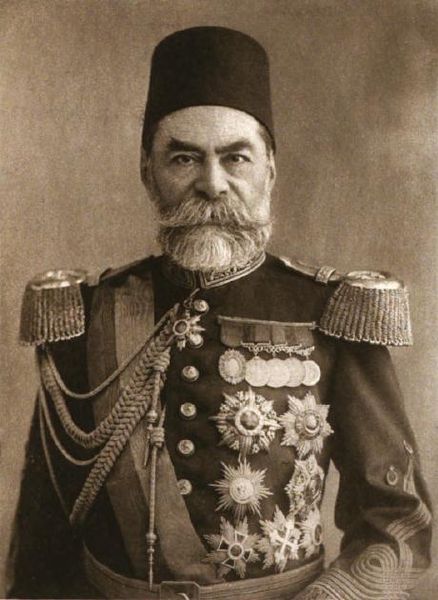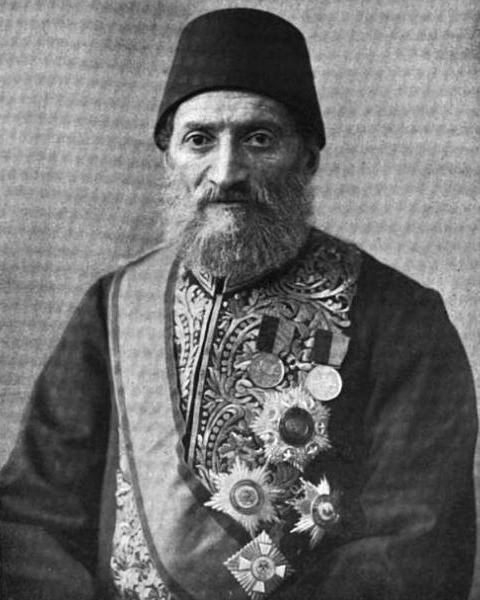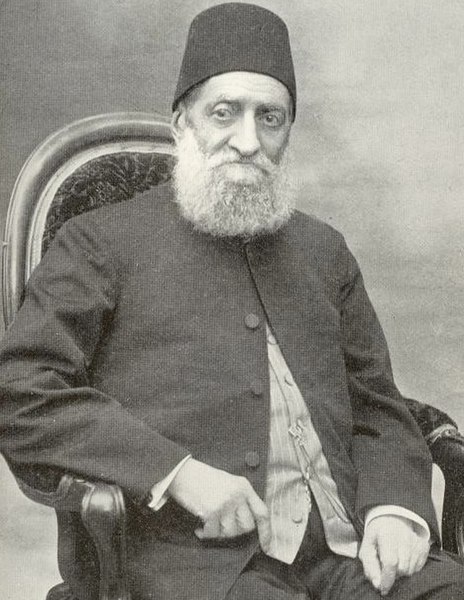<Back to Index>
- Grand Vizier of the Ottoman Empire Gazi Ahmed Muhtar Pasha, 1800+
- Grand Vizier of the Ottoman Empire Kibrisli Mehmed Kâmil Pasha, 1833
PAGE SPONSOR

Gazi Ahmed Muhtar Pasha (or Ahmed Muhtar Pasha) was a Turkish Ottoman grand vizier and general.
He was born at Bursa in Turkey and was educated in the Ottoman military college in Constantinople. He was promoted rapidly and eventually became professor and then governor of the school.
In 1856, he served as an adjutant during the Crimean War; in 1862, as a staff officer in the extremely unsuccessful Montenegrin campaign; and in 1870 - 1871, quelled rebellions in Yemen. He gained the titles of Pasha and Marshal and in 1873 was made commander of the Second Army Corps. During the 1875 uprisings in Bosnia and Herzegovina, he assumed control of the Turkish forces there; and on the outbreak of the Russo - Turkish War, 1877 - 1878, he was sent to take charge of operations in Erzurum. Although the Russians ultimately defeated the Turks in the war, Moukhtar's victories against them in the eastern front won him the title Ghazi ("Victorious").
In 1879, he was appointed the commander of Turkey's frontier with Greece, before being sent in 1885 to serve as the Turkish High Commissioner in Egypt. His final promotion was to Grand Vizier in July 1912, largely due to his prestige as an old military hero, but he resigned on 29 October 1912, since the First Balkan War that had erupted early that month had caught his administration off guard and he was blamed for the sudden defeats.
Ahmed Muhtar Pasha died in 1919. His son Mahmud Muhtar Pasha was also a high ranking commander in the Ottoman Army and the Minister of Ottoman Navy.


Kâmil Pasha (Turkish: Kıbrıslı Mehmet Kamil Paşa, "Mehmed Kamil Pasha the Cypriot"), also spelled as Kiamil Pasha was an Ottoman statesman of Turkish Cypriot origin in the late 19th century and early 20th century, who became, as aside regional or international posts within the Ottoman state structure, grand vizier of the Empire during four different periods.
He was born in Nicosia in 1833, son of Captain Salih Ağa from the village of Gaziler, in Northern Cyprus. His first post was in the household of the Khedive of Egypt who at that time was only nominally dependent to the central Ottoman power in İstanbul. In the course of this appointment he visited London for the Great Exhibition of 1851 in charge of one of the Khedive's sons. Kiamil's sojourn in England left in him a lifelong admiration for Britain and during his career within the Ottoman state, he was always known to be an Anglophile.
Having full command of English, thenceforth to the close of his career he zealously sought the friendship of England for Turkey.
After remaining in Egypt for ten years, Mehmed Kamil exchanged the service of Abbas I for that of the Ottoman Government as of 1860 and for the ensuing nineteen years - that is to say until he first entered the Cabinet - he filled numerous administrative appointments in every part of the Empire. He governed, or helped to govern, provinces such as Eastern Rumelia, Hercegovina, Kosovo and his native Cyprus.
Between 1885 and 1913 he filled the office of Grand Vizier four times. His periods of office were;
- from 25 September 1885 to 4 September 1891, under Abdülhamid II's reign;
- from 2 October 1895 to 7 November 1895, under Abdülhamid II's reign;
- from 5 August 1908 to 14 February 1909, under Abdülhamid II's reign and during the Second Constitutional Era in the Ottoman Empire;
- from 29 October 1912 to 23 January 1913, under Mehmed V Reşad's reign and during the Second Constitutional Era of the Ottoman Empire.
In May 1913, he returned to his native Cyprus which he had not seen since he had ceased to govern it as far back as 1864.
The reason was no happy one. After the Young Turk Revolution of 1908, Kamil initially had tried to compromise with the new men in power. But soon he decided to oppose the Young Turk Regime and became a figurehead of the so-called "liberal" (merely conservative - traditionalist) opposition. After the overthrow of the Young Turk Regime in summer 1912, he became Grand Vizier of the then ruling liberals. But he had no time to consolidate power because the Ottoman Empire got involved in the First Balkan War of 1912/13 and suffered serious military defeat, accompanied by massacres and mass flight of Muslim inhabitants of the contested Balkan provinces. In January 1913, Kamil's government decided to accept severe peace conditions including massive territorial losses. The Young Turks in the military forces used that period of ultimate weakness and governmental unpopularity for their second coup d'état.
On 23 January 1913, Enver Pasha, one of the Young Turk military leaders, burst with some of his associates into the Sublime Porte while the Cabinet was actually in session. One of Enver's officers, Yakup Cemil, shot the Minister of War Nazım Pasha and the group pressed Kamil Paşa to resign immediately.
Kamil was put under house arrest and surveillance. The ex-Grand Vizier (who probably was in danger of life) was invited by his British friend Lord Kitchener to stay with him in Cairo. After three months in Egypt, Mehmed Kamil Pasha decided to wait a favorable turn of fortune in his native Cyprus.
Five weeks after his return to Cyprus the assassination of his Young Turk successor in the Grand Vizierate, Mahmud Şevket Pasha, occurred in June 1913, possibly to avenge the murder of Nazım Pasha. The Young Turk regime reacted with persecution of well known opposition politicians. The prominent Old Turks were either expelled or had to flee from Turkey. Ahmed Djemal Paşa, then Young Turk prefect of the capital Constantinople, indicated to Kamil's family that he had to leave the Ottoman Empire or he would be arrested. His family joined him in exile.
On 14 November 1913, while planning to revisit England in 1914, Mehmed Kamil Paşa suddenly died of syncope and was buried in the court of Arab Ahmed Pasha Mosque.
Sir Ronald Storrs, British Governor of Cyprus from 1926 to 1932, caused a memorial to be raised over Mehmed Kamil Pasha's grave. He also composed the English inscription, carved on the headstone below a Turkish one in old lettering. It runs as follows:
His Highness Kiamil Pasha
Son of Captain Salih Agha of Pyroi
Born in Nicosia in 1833
Treasury Clerk
Commissioner of Larnaca
Director of Evqaf
Four times Grand Vizier of the Ottoman Empire
A Great Turk and
A Great Man.